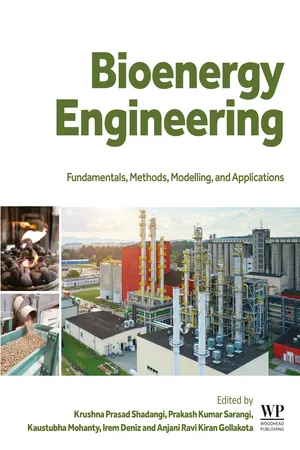
eBook - ePub
Bioenergy Engineering
Fundamentals, Methods, Modelling, and Applications
- 586 pages
- English
- ePUB (mobile friendly)
- Available on iOS & Android
eBook - ePub
Bioenergy Engineering
Fundamentals, Methods, Modelling, and Applications
About this book
Bioenergy Engineering: Fundamentals, Methods, Modelling, and Applications presents the fundamental principles, recent developments, innovative state-of the-art technologies, challenges, solutions and future perspectives on the production of biofuels and bioenergy. Balancing the scientific and engineering aspects of biofuels production, the book guides readers through the chemical kinetics, modeling, thermodynamics, unit operations and technological advancements in fuel processing from conventional and alternative resources. Each chapter of the book starts with the fundamentals and goes on to assess the latest technologies for the production of renewable fuels on topics.
Sections cover biomass utilization, biomass-to-liquid conversion technologies (pyrolysis, liquefaction, solid-state fermentation and submerged fermentation), biomass-to-gas conversion technologies (thermochemical gasification, subcritical and supercritical water gasification, and methanation), gas-to-liquid conversion technologies (Fischer-Tropsch synthesis), carbonization, transesterification, organic transformation, carbon-carbon and carbon-heteroatom coupling reactions, oxidation, reforming, hydrotreating technologies (hydrogenation, hydrodesulfurization, hydrodenitrogenation, hydro dearomatization and hydro demetalization), nanocatalysis and biocatalysis (enzymatic hydrolysis), and much more.
- Analyzes emerging technologies for the sustainable conversion of various waste and non-waste materials into bioenergy and biofuels
- Examines a wide range of feedstocks and conversion pathways for liquid and gaseous biofuels
- Offers practical guidance and data on how to conduct lifecycle assessment, techno-economic analysis, and utilize GIS modeling for a range production pathways
Tools to learn more effectively

Saving Books

Keyword Search

Annotating Text

Listen to it instead
Information
Table of contents
- Title of Book
- Cover image
- Title page
- Table of Contents
- Copyright
- List of contributors
- Chapter 1 Introduction to bioenergy; current status, merits & demerits
- Chapter 2 Feedstock for biofuel production: starch, oilseeds, lignocellulosic and algae-based, fuel logistics of biomass
- Chapter 3 Characterization techniques of biomass: physico-chemical, elemental, and biological
- Chapter 4 Comparisons between fossil fuels and bio-fuels
- Chapter 5 Agricultural waste to fuels and chemicals
- Chapter 6 Cogasification of biomass and coal for the production of biofuels
- Chapter 7 Role of catalysts in biofuel production through fast pyrolysis
- Chapter 8 Advances in gasification techniques
- Chapter 9 Thermal energy storage materials from triglycerides
- Chapter 10 Biological conversion technologies: Enzyme hydrolysis, ethanol fermentation
- Chapter 11 Anaerobic digestion methods for the production of fuels
- Chapter 12 Microbial fuel cells
- Chapter 13 Sustainable energy from food waste via using a sustainable microbial system
- Chapter 14 Algal biofuel and its prospects
- Chapter 15 High-value–added products from microalgae production integrated with bioethanol process
- Chapter 16 Bright-skies to biomass fuels in aviation sector
- Chapter 17 Biohydrogen production by biological water-gas shift reaction and bioelectrochemical systems
- Chapter 18 Methods of catalyst synthesis and recycling processes for biofuel upgradation
- Chapter 19 Biocatalysts for biofuels production
- Chapter 20 Microwave assisted catalysis for biofuel production
- Chapter 21 Alcoholic fuels from food waste in restaurants
- Chapter 22 Bioenergy engineering: fundamentals, methods, modeling, and applications: Mathematical modeling of biomass gasification processes
- Chapter 23 Hydro-deoxygenation of biofuel
- Chapter 24 Economic, social and ecological impacts of bioenergy at local, national and global levels
- Chapter 25 Life cycle assessment of biofuels
- Index
Frequently asked questions
Yes, you can cancel anytime from the Subscription tab in your account settings on the Perlego website. Your subscription will stay active until the end of your current billing period. Learn how to cancel your subscription
No, books cannot be downloaded as external files, such as PDFs, for use outside of Perlego. However, you can download books within the Perlego app for offline reading on mobile or tablet. Learn how to download books offline
Perlego offers two plans: Essential and Complete
- Essential is ideal for learners and professionals who enjoy exploring a wide range of subjects. Access the Essential Library with 800,000+ trusted titles and best-sellers across business, personal growth, and the humanities. Includes unlimited reading time and Standard Read Aloud voice.
- Complete: Perfect for advanced learners and researchers needing full, unrestricted access. Unlock 1.4M+ books across hundreds of subjects, including academic and specialized titles. The Complete Plan also includes advanced features like Premium Read Aloud and Research Assistant.
We are an online textbook subscription service, where you can get access to an entire online library for less than the price of a single book per month. With over 1 million books across 990+ topics, we’ve got you covered! Learn about our mission
Look out for the read-aloud symbol on your next book to see if you can listen to it. The read-aloud tool reads text aloud for you, highlighting the text as it is being read. You can pause it, speed it up and slow it down. Learn more about Read Aloud
Yes! You can use the Perlego app on both iOS and Android devices to read anytime, anywhere — even offline. Perfect for commutes or when you’re on the go.
Please note we cannot support devices running on iOS 13 and Android 7 or earlier. Learn more about using the app
Please note we cannot support devices running on iOS 13 and Android 7 or earlier. Learn more about using the app
Yes, you can access Bioenergy Engineering by Krushna Prasad Shadangi,Prakash Kumar Sarangi,Kaustubha Mohanty,Irem Deniz,Anjani Ravi Kiran Gollakota in PDF and/or ePUB format, as well as other popular books in Physical Sciences & Energy. We have over one million books available in our catalogue for you to explore.